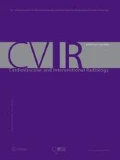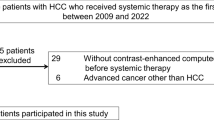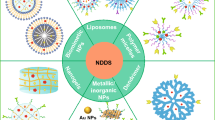Abstract
Transarterial chemoembolization (TACE) involves the emulsification of a chemotherapeutic agent in a viscous drug carrier, delivered intra-arterially to liver tumor for maximum effect. TACE reduces arterial inflow, diminishes washout of the chemotherapeutic agent, and decreases systemic exposure. Despite evidence of some clinical success with TACE, a new type of microspheres with drug-eluting capabilities may offer a precisely controlled and sustainable release of the chemotherapeutic agent into the tumor bed. In animal trials tumor necrosis (approaching 100%) was greatest at 7 days, with significantly lower plasma concentrations of doxorubicin than in control animals treated with doxorubicin intra-arterially. Clinically, drug-eluting microspheres loaded with doxorubicin, either at 75 mg/m2 or at a fixed dose of 150 mg, were used recently and no severe disorders of the hepatic function were observed postprocedure, while a substantial reduction of the fetoprotein levels occurred. An interim analysis of the first 15 patients from the Hong Kong group at 3 months showed an objective response rate of 61.54% and 53.84% according to EASL criteria and RECIST criteria, respectively, and a survival rate of 93.3%. In this paper we present how to use microspheres loaded with doxorubicin and review their clinical value and preliminary performance for treatment of unresectable liver cancer.




Similar content being viewed by others
References
Aliberti C, Tilli M, Benea G, Fiorentini G (2006) Trans–arterial chemoembolization (tace) of liver metastases from colorectal cancer using irinotecan-eluting beads: preliminary results. Anticancer Res 26:3793–3795
Andresen TL, Jensen SS, Jorgensen K (2005) Advanced strategies in liposomal cancer therapy: problems and prospects of active and tumor specific drug release. Prog Lipid Res 44:68–97
Brown KT (2004) Fatal pulmonary complications after arterial embolization with 40–120-μm tris-acryl gelatin microspheres. J Vasc Interv Radiol 15:197–200
Brown KT, Nevins AB, Getrajdman GI, Brody LA, Kurtz RC, Fong Y, Blumgart LH (1998) Particle embolization for hepatocellular carcinoma. J Vasc Interv Radiol 9:822–828
Bruix J, Llovet JM (2002) Prognostic assessment and evaluation of the benefits of treatment. J Clin Gastroenterol 35:S138–S142
Bruix J, Sherman M, Llovet JM, Beaugrand M, Lencioni R, Burroughs AK, Christensen E, Pagliaro L, Colombo M, Rodes J (2001) Clinical management of hepatocellular carcinoma. Conclusions of the Barcelona-2000 EASL conference. European Association for the Study of the Liver. J Hepatol 35:421–430
Chung JW, Park JH, Han JK, Choi BI, Han MC, Lee HS, Kim CY (1996) Hepatic tumors: predisposing factors for complications of transcatheter oily chemoembolization. Radiology 198:33–40
Covey AM, Maluccio MA, Schubert J, BenPorat L, Brody LA, Sofocleous CT, Getrajdman GI, Fong Y, Brown KT (2006) Particle embolization of recurrent hepatocellular carcinoma after hepatectomy. Cancer 106:2181–2189
de Baere T, Teriitehau C, Deschamps F, Cazejust J, Abdel Rehim M, Hechelhammer L (2006) Transarterial chemoembolization of patients with neuroendocrine hepatic metastases using drug eluting beads. Eur Radiol 16:C84
Dumortier J, Chapuis F, Borson O, Davril B, Scoazec JY, Poncet G, Henry L, Boillot O, Mion F, Berger F, Partensky C, Paliard P, Valette PJ (2006) Unresectable hepatocellular carcinoma: survival and prognostic factors after lipiodol chemoembolisation in 89 patients. Dig Liver Dis 38:125–133
Gabizon A, Catane R, Uziely B, Kaufman B, Safra T, Cohen R, Martin F, Huang A, Barenholz Y (1994) Prolonged circulation time and enhanced accumulation in malignant exudates of doxorubicin encapsulated in polyethylene-glycol coated liposomes. Cancer Res 54:987–992
Gabizon AA (1994) Liposomal anthracyclines. Hematol Oncol Clin North Am 8:431–450
Gao J, Qian F, Szymanski-Exner A, Stowe N, Haaga J (2002) In vivo drug distribution dynamics in thermoablated and normal rabbit livers from biodegradable polymers. J Biomed Mater Res 62:308–314
Garnick MB, Ensminger WD, Israel M (1979) A clinical-pharmacological evaluation of hepatic arterial infusion of adriamycin. Cancer Res 39:4105–4110
Hong K, Georgiades CS, Geschwind JF (2006) Technology insight: Image-guided therapies for hepatocellular carcinoma—intra-arterial and ablative techniques. Nat Clin Pract Oncol 3:315–324
Hong K, Khwaja A, Liapi E, Torbenson MS, Georgiades CS, Geschwind JF (2006) New intra-arterial drug delivery system for the treatment of liver cancer: preclinical assessment in a rabbit model of liver cancer. Clin Cancer Res 12:2563–2567
Johnson PJ, Kalayci C, Dobbs N, Raby N, Metivier EM, Summers L, Harper P, Williams R (1991) Pharmacokinetics and toxicity of intraarterial adriamycin for hepatocellular carcinoma: effect of coadministration of lipiodol. J Hepatol 13:120–127
Lefrak EA, Pitha J, Rosenheim S, Gottlieb JA (1973) A clinicopathologic analysis of adriamycin cardiotoxicity. Cancer 32:302–314
Lewis AL, Gonzalez MV, Lloyd AW, Hall B, Tang Y, Willis SL, Leppard SW, Wolfenden LC, Palmer RR, Stratford PW (2006) DC bead: in vitro characterization of a drug-delivery device for transarterial chemoembolization. J Vasc Interv Radiol 17:335–342
Lewis AL, Taylor RR, Hall B, Gonzalez MV, Willis SL, Stratford PW (2006) Pharmacokinetic and safety study of doxorubicin-eluting beads in a porcine model of hepatic arterial embolization. J Vasc Interv Radiol 17:1335–1343
Llovet JM, Real MI, Montana X, Planas R, Coll S, Aponte J, Ayuso C, Sala M, Muchart J, Sola R, Rodes J, Bruix J (2002) Arterial embolisation or chemoembolisation versus symptomatic treatment in patients with unresectable hepatocellular carcinoma: a randomised controlled trial. Lancet 359:1734–1739
Lo CM, Ngan H, Tso WK, Liu CL, Lam CM, Poon RT, Fan ST, Wong J (2002) Randomized controlled trial of transarterial lipiodol chemoembolization for unresectable hepatocellular carcinoma. Hepatology 35:1164–1171
Lopez RR Jr., Pan SH, Hoffman AL, Ramirez C, Rojter SE, Ramos H, McMonigle M, Lois J (2002) Comparison of transarterial chemoembolization in patients with unresectable, diffuse vs focal hepatocellular carcinoma. Arch Surg 137:653–657, discussion 657–658
Malagari K, Chatzimichail K, Alexopoulou E, Economou GP, Letsou DI, Vergadis V, Loggitsi D, Kelekis DA, Gouliamos A (2006) Hehepatocellular carcinoma chemoembolization with DC beads. Eur Radiol 16:C24
Muller HJ, Port RE, Grubert M, Hilger RA, Scheulen M, Mross K (2003) The influence of liver metastases on the pharmacokinetics of doxorubicin—a population-based pharmacokinetic project of the CESAR-APOH. Int J Clin Pharmacol Ther 41:598–599
Osuga K, Murakami T, Nakamura H, Hori S (2001) [A new embolic material: Sap-microsphere]. Nippon Rinsho 59(Suppl 6):534–538
Padhani AR, Ollivier L (2001) The recist (response evaluation criteria in solid tumors) criteria: implications for diagnostic radiologists. Br J Radiol 74:983–986
Pelage JP, Walker WJ, Dref OL (2002) Uterine necrosis after uterine artery embolization for leiomyoma. Obstet Gynecol 99:676–677, author reply 677
Rand T, Loewe C, Schoder M, Schmook MT, Peck-Radosavljevic M, Kettenbach J, Wolf F, Schneider B, Lammer J (2005) Arterial embolization of unresectable hepatocellular carcinoma with use of microspheres, lipiodol, and cyanoacrylate. CardioVasc Interv Radiol 28:313–318
Siegal T, Horowitz A, Gabizon A (1995) Doxorubicin encapsulated in sterically stabilized liposomes for the treatment of a brain tumor model: biodistribution and therapeutic efficacy. J Neurosurg 83:1029–1037
Sigurdson ER, Ridge JA, Daly JM (1986) Intra-arterial infusion of doxorubicin with degradable starch microspheres. Improvement of hepatic tumor drug uptake. Arch Surg 121:1277–1281
Stadler A, Lomoschitz FM, Schernthaner RE, Kettenbach J, Katzler I, Lammer J (2006) Chemoembolization of unresectable hepatocellular carcinoma with doxorubicin loaded microspheres: a pilot study. In: Radiological Society of North America: Scientific Assembly and Annual Meeting Program, p 252
Tancredi T, McCuskey PA, Kan Z, Wallace S (1999) Changes in rat liver microcirculation after experimental hepatic arterial embolization: comparison of different embolic agents. Radiology 211:177–181
Taylor RR, Tang Y, Gonzalez MV, Stratford PW, Lewis AL (2007) Irinotecan drug eluting beads for use in chemoembolization: in vitro and in vivo evaluation of drug release properties. Eur J Pharm Sci 30:7–14
Therasse P, Arbuck SG, Eisenhauer EA, Wanders J, Kaplan RS, Rubinstein L, Verweij J, Van Glabbeke M, van Oosterom AT, Christian MC, Gwyther SG (2000) New guidelines to evaluate the response to treatment in solid tumors. European Organization for Research and Treatment of Cancer, National Cancer Institute of the United States, National Cancer Institute of Canada. J Natl Cancer Inst 92:205–216
Varela M, Real MI, Brunet M, et al. (2005) Chemoembolization of hepatocellular carcinoma with drug eluting beads reduces the systemic availability of doxorubicin. A pharmacokinetic assessment. Presented at AASLD, San Francisco, CA, November 11–15, abstract P485
Acknowledgments
Substantial support was provided by preliminary data obtained from R.T. Poon, The University of Hong Kong, Hong Kong, China, in vitro characterization of DC beads published by Lewis et al., and the preclinical assessment in a rabbit model published by K. Hong et al.
Author information
Authors and Affiliations
Corresponding author
Rights and permissions
About this article
Cite this article
Kettenbach, J., Stadler, A., Katzler, I.v. et al. Drug-Loaded Microspheres for the Treatment of Liver Cancer: Review of Current Results. Cardiovasc Intervent Radiol 31, 468–476 (2008). https://doi.org/10.1007/s00270-007-9280-6
Received:
Revised:
Accepted:
Published:
Issue Date:
DOI: https://doi.org/10.1007/s00270-007-9280-6




